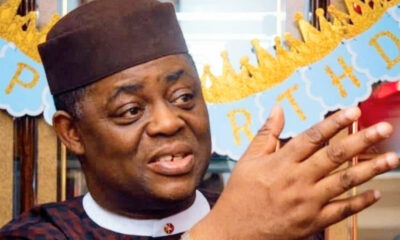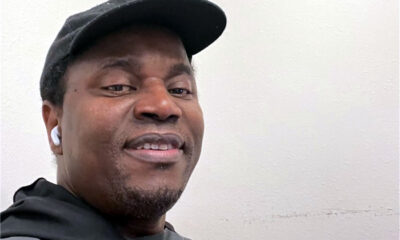Opinion
Wande Abimbola @91: How an àbíkú decided to live (1)

Opinion
Who has bewitched our beloved America? – Femi Fani-Kayode

Who has bewitched our beloved America? – Femi Fani-Kayode
I really do wonder whether those great patriots that fought a long and bloody war against
British colonial rule and founded the United States of America (US) in 1776 like George Washington, Thomas Jefferson, John Adams, Benjamin Franklin and so many others envisaged what has happened to their beloved country today?
I wonder whether the Pilgrim Fathers and great and wise men of old who, by faith in the Living God, left the Old World, crossed the Atlantic ocean in hazardous conditions and went to the New to establish a new beginning and build a new nation founded on freedom, equality, the fear of God and solid good old fashioned Christian virtues and values, would believe what the beloved nation they toiled, prayed for, established and worked so hard to build has turned into today?
Would they not all be turning in their graves?
A nation that was once referred to by both friend and foe as the “land of the free and the home of the brave” is now neither free nor brave.
A mighty nation that delivered itself from its own internal prejudices, contradictions and demons by fighting a brutal civil war to free the slaves and that presented a great hope for those that dreamt of a world where all men and women could have equal opportunities, regardless of class, history, color, race or creed, has now lost its sense of decency, equity, honor and morality and turned into a corrupt, power drunk, morally bankrupt, blood-lusting, war-loving, terror-funding, egocentric and idiosyncratic collection of self-serving, self-seeking, cowardly and deluded individuals who serve the interests of not their own people but that of AIPAC, the Jewish lobby and the State of Israel.
A rich and powerful nation of over 300 million people that delivered the world from evil in both the First and Second World Wars, that defeated and dismantled the curse of Soviet Communism, that entrenched democracy throughout much of the world and that literally rules the waves today as the greatest super power in the history of humanity in a unipolar world, is now nothing but the lap dog of little Israel?
It seems so hard to believe. Yet true it is!
READ ALSO:
- Gaza: Thousands rally for hostage deal as ceasefire talks continue
- Ronaldo’s hat-trick leads Al Nassr to a 6-0 Victory over Al Wehda
- Nigeria to reduce electricity supply to Niger Republic, Benin, Togo
Like Lucifer fell from heaven, so you, O mighty America, has fallen from grace!
I weep for you.
Apart from your internal decay where the family system has been destroyed and traditional religious beliefs have been replaced by humanism and a godless philosophy in which the Lord is no longer revered, where men marry men, where abortions are encouraged, where homosexuality is adored, where Satanism is practised, where money is worshipped, where God has been banned from the schools and indeed every sphere of human endeavour and where the establishment of a New World Order is your ultimate objective, you have also, with the help of your servile and fawning vassals like the United Kingdom, France, Germany, Holland and others, debased and destroyed the fortunes and vision of many countries with your reckless and self-serving foreign policy and your insatiable thirst for power and world domination.
Opinion
Minimum wage, maximum deceit and moral cowardice – Farooq Kperogi

Minimum wage, maximum deceit and moral cowardice – Farooq Kperogi
After three months of bootless committee meetings in the comfort of air-conditioned offices at the cost of one billion naira (President Bola Tinubu approved 500 million naira to “start with… first”) and about a month after the expiration of the last minimum wage approved in 2019, the Tinubu government has not been able to approve a new minimum wage for Nigerian workers even when it wastes no time to approve policies that inflict maximum suffering on poor people.
On May 1, I woke up here in Atlanta to the news of an increase in the minimum wage of workers, which would be backdated to January 1st. Although it’s the legal thing to do, I was impressed nonetheless, not only because I’ve significantly scaled back my expectations about what the government can do but also because I know most Nigerian workers could use the relief that the increase and the arrears would bring.
So, I started looking for the exact amount of the new minimum. I scouted social media platforms and news websites. I had no luck.
It turned out that I was mistaken. The national minimum wage has not been increased even though the current one expired on April 17, which is frankly untenably criminal.
All that had happened, I later learned, was that the federal government had approved an increase of between 25 per cent and 35 per cent in the salaries of certain civil servants, according to the National Salaries, Incomes and Wages Commission (NSIWC).
“They include Consolidated Public Service Salary Structure (CONPSS), Consolidated Research and Allied Institutions Salary Structure (CONRAISS) and Consolidated Police Salary Structure (CONPOSS),” NSIWC’s spokesman by the name of Emmanuel Njoku said in a statement on April 30. “Others are: Consolidated Para-military Salary Structure (CONPASS), Consolidated Intelligence Community Salary Structure (CONICCS) and Consolidated Armed Forces Salary Structure (CONAFSS). The increases will take effect from January 1.”
READ ALSO:
- EFCC nabs 20 suspected internet fraudsters in Sapele
- Nigerian pastor under fire over porn-addiction remedy
- 40 AK-47 rifles recovered from mastermind of Kaduna-Abuja train attack
That’s some impenetrable mumbo jumbo for those of us who are not civil servants or who are not tutored in the tortured, tortuous ways of the civil service. It’s obvious, though, that this is not the new minimum wage.
A 25 percent increase on the existing minimum wage, that is, 30,000 naira, would amount to a mere additional 7,500 naira, and a 35 percent increase is a mere additional 10,500 naira. That’s lower than Edo State’s new minimum wage of 70,000 naira.
This is both exasperating and unconscionable, especially given that this government, since its inception, has understood its role as consisting of merely conceiving, initiating, and implementing policies that squeeze the hope and life out of poor and middle-class folks.
The originative signal of the intensity of the hardheartedness of this government came from the precipitate, ill-conceived, thoroughly unjustified announcement of the removal of petrol subsidies on President Tinubu’s inaugural day.
He followed this up with the disastrous “floating” of the naira, which wiped out trillions from the economy, hemorrhaged existing foreign investments, and made nonsense of the pittance workers collected as salaries.
Not done, the government chose to hike tariffs on electricity (that’s barely there to start with) to amounts that regular people can’t afford. Fairly regular electricity will now become the exclusive privilege of people and companies that can pay extortionate amounts for it. This will, of course, exacerbate the existing cost-push inflation in the economy that was ignited by the removal of petrol subsidies.
Now life has become an unwinnable daily war for most people as a result of these policies. But President Tinubu brags that these life-sucking policies represent “courage.” By that, it is obvious he meant that these policies are so soulless, so callous, so predatory that normal people would violently revolt against them but that he damned that prospect and did what he did anyway.
He should be lucky that his predecessor, Muhammadu Buhari, laid the foundation for the current mystifying docility of Nigerians, for the emergent national culture of toleration of injustice without a fight, and for the absolute death of critically collective democratic citizenship.
As I pointed out in a previous column, preying on vulnerable members of society who have lost the will to resist injustice is no courage. It’s moral cowardice. And there’s no better example of the deceit and cowardice of the government than its inability or unwillingness to implement a basic minimum wage for workers after realizing trillions of naira from the removal of petrol subsidies (which has devalued the worth of the existing minimum wage by several folds).
The government has never ever needed a committee to implement policies that hurt the poor and the middle class. All it usually needs is Tinubu’s cowardly and preposterous presidential “courage.”
READ ALSO:
- Finally, NERC unbundles TCN, creates new system operator
- I never said I’m a billionaire— Ex-Anambra CP
- Terrorists kill eight vigilantes in Kaduna community, two village heads
It only needs committees—which sit for extended periods because every sitting is a money-making venture—when any issues concern giving just a little welfare to beleaguered workers. Although the government is obligated by law to conduct nationwide public hearings as a precursor to increasing electricity tariffs, according to Femi Falana, the government chose not to be distracted by such pesky legalities in its haste to do what it seems to love to do best: make poor citizens squirm in torment and cry.
Accountable and socially responsible governments all over the world preoccupy their minds with finding ways to assuage the existential injuries that life episodically throws at citizens. But like the Buhari regime that preceded the current government, there appears to be a single-minded obsession by people in government with making life more miserable than it already is for everyday folks every day.
It seems to me that this government’s reason for being is to inflict pain and misery on Nigerians. It is what gives it its highs and delectations.
I get the sense that the strategists and tacticians of the government spend their time brainstorming on the next sadistic agony to visit on Nigerians. When they are out of ideas, they might choose to remove subsidies on the air Nigerians breathe, the land Nigerians walk on, and even the saliva Nigerians gulp.
By the end of this month, the Tinubu government will be one year old. Can it honestly point to a single thing it has done that has brought even a smidgeon of relief to our people, that has given ordinary people a reason to smile?
In less than one year, the Tinubu government has built a public image as a government that invests all its energy and resources into devising ways to hurt the people and to being a passive, unresisting servant of the IMF and the World.
We know that historically the IMF has always been opposed to increases in minimum wages. Last year, for instance, the International Monetary Fund (IMF) warned that the planned minimum wage increases in many countries in Central, Eastern, and South-Eastern Europe (CEE) should be stopped because the “increases will result in more persistent inflation or lower employment, especially given relatively weak productivity growth in the region.”
The IMF always encourages, even compels, governments in Third World countries to totally remove all subsidies that benefit the poor but warns them against increasing minimum wages.
Could the reluctance by the Tinubu government to increase the minimum wage of workers be inspired by its fear of the IMF, its lord and savior? I don’t know, but it’s worth exploring.
Well, as I pointed out in a previous column, Nigeria’s elite have a personal incentive to obey the IMF. The increased financial burden that IMF’s policies impose on poor Nigerians helps to keep them in check and renders them more docile and controllable. The poorer people are the less strength they tend to have to resist oppression and the more likely they are to be esurient for crumps from their oppressors.
So, governance by sadism is rooted in the desire to keep the vast majority of the people dirt poor, miserable, ignorant, and therefore more manipulatable.
Minimum wage, maximum deceit and moral cowardice – Farooq Kperogi
Farooq Kperogi is a renowned newspaper columnist and United States-based professor of journalism.
Opinion
Why Yahaya Bello does not represent the youth – Farooq Kperogi

Why Yahaya Bello does not represent the youth – Farooq Kperogi
A persistent but entirely illogical and factually inaccurate response to my column on former Kogi State governor Yahaya Bello revolves around the notion that his terrible record as a governor somehow delegitimizes youth participation in government and undermines the “Not Too Young to Run” bill.
First of all, Yahaya Bello became a governor at 41 in 2016. There’s no country in the world where 41 is regarded as “youth.” He is a full-grown adult.
The UN defines youth as people between the ages of 15 and 24. In the United States, it’s between 15 and 24 years. In the European Union and the United Kingdom, it encompasses individuals aged 15 to 25.
The Commonwealth limits it to the ages of 15 through 29. But the African Youth Charter, which has perhaps the most elastic definitional compass of youth in the world, defines it as “any individual between 15-35 years of age.”
The Nigerian National Youth Policy obviously derives inspirational strength for its conception of youth from the African Youth Charter because it also officially refers to people between the ages of 18 and 35 as belonging to the “youth.”
This is all a giant irony, of course. Nigeria, which has an average life expectancy of 55 years, regards 35 years as “youth” (which means, on average, Nigerians spend only 20 years as “adults”) while industrialized societies with higher average life expectancies (it’s 77 for the United States and 81 for the European Union) have a lower age threshold for youth.
It’s even worse in the general Nigerian population, which regards a 48-year-old man (who has already lived more than half of his life) as a “youth” and uses his indiscretions, ineptitude, infantilism, and larceny as justifications to shut out young people from governance.
Yahaha Bello didn’t need the “Not Too Young to Run” legislation to be a governor. The minimum age required to be a governor in the 1999 constitution—before the “Not Too Young to Run” bill was signed into law on May 31, 2018—was and still is 35. The bill did not change the age requirement for governorship positions.
READ ALSO:
- Judicial Reform: NBA seeks removal of CJN as head of NJC
- Why I’m not ashamed doing menial jobs in US — Doris Simeon
- Tinubu names Jim Ovia chairman of student loan fund
That was why we had many people who were elected governors in their 30s in 1999. For example, Ibrahim Saminu Turaki was elected governor of Jigawa State at the age of 36. Donald Duke was 38 years old when he was elected governor of Cross River State in 1999. Orji Uzor Kalu of Abia was 39. Ahmad Sani Yerima of Zamfara was 39. Enugu State’s Chimaroke Nnamani was 39.
With a few exceptions, the rest of the governors in 1999 were in their 40s (Delta State’s James Ibori was exactly 40), which is consistent with Yahaya Bello’s age. Why didn’t critics of youth participation in government invoke the failures of much younger governors than Bello at the incipience of the Fourth Republic to delegitimize “youth” participation in government?
The obsession with the youth of people in government in Nigeria is particularly strange because we have had Yakubu Gowon, a then 31-year-old unmarried man, as Head of State. Olusegun Obasanjo was 38 when he first became the head of state. Muhammadu Buhari and Thomas Aguiyi-Ironsi were 41. IBB was 44.
In fact, most of the early leaders we venerate today were elected/appointed into their positions when they were in the same age group as Yahaya Bello. For example, Sir Ahmadu Bello assumed office as the Premier of the Northern Region on October 1, 1954, at the age of 44.
Chief Obafemi Awolowo became the Premier of the Western Region in 1952 at the age of 44. Sir Abubakar Tafawa Balewa was 47/48 when he became the Prime Minister of Nigeria in 1960. Murtala Muhammed was only 36 when he became the Head of State of Nigeria on July 29, 1975.
The examples are legion, but the point is that there is nothing unusual about someone of Yahaya Bello’s age being a governor. That’s why I find the focus on his age both ignorant and ahistorical.
Of course, more than anything, all that this points to is that people who got into government in their 30s and 40s two or three decades ago are still in power or hanging around the corridors of power, which leaves only a little space for new entrants from that age bracket.
So, the few people in their 30s and 40s who make it to the circles of political power in contemporary Nigeria come across as novel, as marvels of young people in government, and as generational curiosities whose missteps are exteriorized to all people within their age range who are outside the orbit of power and who might want to get into it.
That’s unfair. Just like the incompetence, callousness, and venality of older politicians shouldn’t be used against all older people, Yahaya Bello’s villainy and corruption should not be used against people in his age bracket— or younger.
This attitude implies that had Yahaya Bello been a geriatric fuddy-duddy, and not a 48-year-old man, he would not have been the debauched, profligate thug that he is, which is absolute flapdoodle.
Age has no effect on integrity and probity. It is defeatist and evinces low self-worth for young people to beat themselves up because a 48-year-old man who became a governor at 41 turned out to be a rotten, incurable crook who pillaged his state without the slightest tinge of compunction and then installed a slavish, empty-headed puppet as his successor.
READ ALSO:
- Yahaya Bello: Court summons EFCC chair over contempt
- Nollywood veteran actor, Ogunjimi is dead
- Soldier dies while ‘rushing to rescue brother arrested by policemen’
It’s mostly young people—in the peculiar way Nigerians understand young people—who are saying Yahaya Bello’s spectacular incompetence and depravity symbolize the failure of “youth” in governance and that the older generation is justified in its reluctance to share power with young people.
In other words, if a few “youths” in government mess up, all youth should take the blame for it, accept that the failure of one of them is the failure of all of them, and then step back for the older order to continue to misrule exclusively.
Notice that no one, certainly no older person I know of, says older people shouldn’t be allowed to govern because they’ve been messing up all these years. Only the “youth” are delegitimized on account of their age when they mess up. That is reverse ageism, that is, the idea that only old age, not youth or knowledge, should confer authority or respect on people.
We are more than our ages. We embody a totality of multiple influences. The fact that Yahaya Bello was a grasping, primitive bandit in government doesn’t mean every 41-year-old who becomes a governor will be like him. That’s ridiculously reductionist.
In any case, youth or old age are not permanent states. They are in perpetual flux. It is yesterday’s youth that become today’s older people.
Nigeria is one of the world’s youngest countries with a median age of 16. Yet, when we look at the corridors of power, the vibrancy of youth is conspicuously absent. This gap between our young population and their representation in governance is not just a gap in numbers, but a gap in fresh ideas, innovation, and the spirit of our nation.
Yahaya Bello did not fail because he was young. He failed because he never prepared to succeed, and that wasn’t a function of his “youth.” Donald Duke was the second youngest governor in 1999, and he is credited with making tremendous marks in governing Cross River State.
Yes, age and experience have their place. But so does youth. An Igbo proverb, after all, says “If a child washes his hands, he could eat with Kings.”
Farooq Kperogi is a renowned Nigerian newspaper columnist and United States-based professor of journalism
-

 Entertainment2 days ago
Entertainment2 days agoNollywood veteran Shan George weeps as fraudster clears ₦3.6m from her account (VIDEO)
-

 International2 days ago
International2 days agoGaza: Thousands rally for hostage deal as ceasefire talks continue
-

 metro2 days ago
metro2 days agoDSS seals Plateau clinic over patient’s death
-

 Politics2 days ago
Politics2 days agoPDP: Sule Lamido blames court for mass resignation from party
-

 Opinion2 days ago
Opinion2 days agoWho has bewitched our beloved America? – Femi Fani-Kayode
-

 Sports2 days ago
Sports2 days agoRonaldo’s hat-trick leads Al Nassr to 6-0 victory over Al Wehda
-

 International10 hours ago
International10 hours agoNetanyahu rubbishes Hamas ceasefire proposal
-

 News3 days ago
News3 days agoUpdated: NNPC blames fuel scarcity on panic buying, hoarding, marketers disagree












